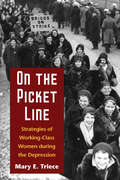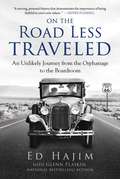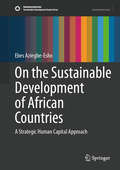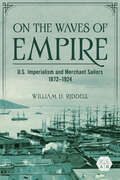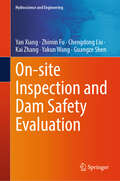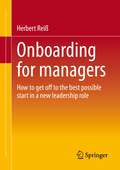- Table View
- List View
On the Other Side: Liabilities and Equity--Understanding a Balance Sheet
by John Case Karen Berman Joe KnightThis chapter looks at the liabilities and equity side of a balance sheet, which shows how assets were obtained.
On the Picket Line: Strategies of Working-Class Women during the Depression
by Mary TrieceBonnie Ritter Book Award, National Communication Association's Feminist and Women Studies Division, 2008. On the Picket Line uncovers the voices of working-class women, particularly those active in the Communist Party, U.S.A., in order to examine how these individuals confronted the tensions between their roles as workers, wives, mothers, and consumers. Combining critical analysis, Marxist and feminist theory, and labor history, Mary E. Triece analyzes the protest tactics employed by working class women to challenge dominant ideologies surrounding domesticity. She details the rhetorical strategies used by women to argue for their rights as workers in the paid labor force and as caregivers in the home. Their overtly coercive tactics included numerous sit-ins, strikes, and boycotts that won tangible gains for working poor and unemployed women. The book also gives voice to influential figures in the 1930s labor movement (many of whom were members of the Communist Party, U.S.A.), such as Ella Reeve Bloor, Margaret Cowl, Anna Damon, Ann Burlak, and Grace Hutchins. Triece ultimately argues that these confrontational protest tactics of the 1930s remain relevant in today’s fights for more humane workplaces and better living conditions.
On the Political Economy of Market Socialism: Essays and Analyses (Routledge Revivals Ser.)
by James A. YunkerThis title was first published in 2001. Spanning a quarter of a century, this collection makes conveniently accessible 14 of Yunker’s thorough and highly illuminating contributions to the literature on market socialism.
On the Road Less Traveled: An Unlikely Journey from the Orphanage to the Boardroom
by Glenn Plaskin Ed HajimA powerful story touched with family trauma, deprivation, and adversity balanced by a life of hard work and philanthropy!On the Road Less Traveled is the inspirational story of Edmund A. Hajim, an American financier and philanthropist who rises from dire childhood circumstances to achieve professional success and personal fulfillment. At age three, Hajim is kidnapped by his father, driven from St. Louis to Los Angeles, and told that his mother is dead. His father soon abandons him in order to seek employment—mostly in vain—leaving his son behind in a string of foster homes and orphanages. This establishes a pattern of neglect and desertion that continues for Hajim&’s entire childhood, forever leaving its mark. From one home to another, the lonely boy learns the value of self-reliance and perseverance despite his financial deprivation and the trauma of being an orphan. As time passes, Hajim displays a powerful instinct for survival and a burning drive to excel. A highly motivated student and athlete, he earns an NROTC college scholarship to the University of Rochester; serves in the United States Navy; works as an application research engineer; then attends Harvard Business School, where he finds that the financial industry is his true calling. So begins his rapid ascent in the corporate world, which includes senior executive positions at E. F. Hutton, Lehman Brothers, and fourteen years as CEO of Furman Selz, growing the company more than tenfold. He also creates a happy and abundant family life, though he never forgets what it means to struggle. At age sixty, he is reminded of his painful past when a family secret emerges that brings the story full circle.
On the Road to Becoming a Successful Marriage and Family Therapist: An Insider's Handbook from Graduate School Through Licensure... and Beyond!
by Cris Walker RoskelleyThis is an exciting time in the psychotherapy field. With the continued growth of the internet, the practice of therapy continues to grow and evolve... for the better! In the following pages, you will encounter stories of my own experiences as well as many tips, both my own and from other MFT professionals, for navigating the road ahead. I have also included quotations from leading experts in the field of psychotherapy.
On the Road to Economic Prosperity: The Role of Infrastructure in Ghana (Elements in the Economics of Emerging Markets)
by Tuan Anh Luong Zenas AzumaThis Element investigates how the Ghanaian household wealth index is impacted by travel time reduction, which is a direct effect of infrastructural investments from 2000 to 2016. The wealth index is constructed based on the possession of selected assets and reflects the well-being of residents in Ghana. The Element employs two datasets, the Demographic and Health Survey (DHS) and the DHS Covariates. The two-stage least square estimation is implemented to establish the causal relationship. The Element finds that a ten percent reduction in travel time from 2000 to 2015 would result in a 1.2 percent increase in the wealth index from 2003 to 2016. This finding is robust to various settings, including the addition of more control variables, the use of different instrumental variables, and the study of both short-term and long-term effects. The analysis lends support to the Ghanaian government's current economic and infrastructure development plans.
On the Role of Paradigms in Finance (Alternative Voices in Contemporary Economics)
by Kavous ArdalanSocial theory can usefully be conceived in terms of four key paradigms: functionalist, interpretive, radical humanist and radical structuralist. The four paradigms are founded upon different assumptions about the nature of society and each generates distinctive theories, concepts and analytical tools. Finance theory is based on the functionalist paradigm and for the most part finance theorists are unaware of the philosophical tradition to which they belong. By relating finance to the four paradigms, Ardalan's work offers a concise understanding of the multifaceted nature of finance. He recommends theorists adopt a diversity of paradigms and discusses its benefits by application to the following phenomena: the development of academic finance, the mathematical language of academic finance, the mathematics of academic finance, money, corporate governance, markets, technology and education.
On the Run: Fugitive Life in an American City
by Alice GoffmanThis book is an on-the-ground account of the US prison boom: a close-up look at young men and women living in one poor and segregated Black community transformed by unprecedented levels of imprisonment and by the more hidden systems of policing and supervision that have accompanied them. Because the fear of capture and confinement has seeped into the basic activities of daily living--work, family, romance, friendship, and even much-needed medical care--it is an account of a community on the run.
On the Rural: Economy, Sociology, Geography
by Henri LefebvreA collection of previously untranslated writings by Henri Lefebvre on rural sociology, situating his research in relation to wider Marxist workOn the Rural is the first English collection to translate Lefebvre&’s crucial but lesser-known writings on rural sociology and political economy, presenting a wide-ranging approach to understanding the historical and rural sociology of precapitalist social forms, their endurance today, and conditions of dispossession and uneven development. In On the Rural, Stuart Elden and Adam David Morton present Lefebvre&’s key works on rural questions, including the first half of his book Du rural à l&’urbain and supplementary texts, two of which are largely unknown conference presentations published outside France. On the Rural offers methodological orientations for addressing questions of economy, sociology, and geography by deploying insights from spatial political economy to decipher the rural as a terrain and stake of capitalist transformation. By doing so, it reveals the production of the rural as a key site of capitalist development and as a space of struggle. This volume delivers a careful translation—supplemented with extensive notes and a substantive introduction—to cement Lefebvre&’s central contribution to the political economy of rural sociology and geography.
On the Search for Well-Being
by Henry J. BrutonThis book takes on one of the great questions of the day: Why are some countries enormously rich and others so heartbreakingly poor? Henry J. Bruton organizes the discussion around three basic ideas. The first is that well-being reflects not only the availability and distribution of goods and services, but also employment, values, institutions, and quality of preferences. The second is that ignorance is ubiquitous; hence growth of well-being depends primarily on commitments to searching and learning. The extent of such commitments is embedded in deep-seated characteristics of the society, its history, and the degree to which it can look ahead. The third is that economic policy-making is largely a matter of muddling through; furthermore, the idea that an economy can be assumed to be in a general equilibrium and can therefore be left to itself must be rejected. The author explores these ideas and their implications for the processes of growth and for policies to facilitate that growth. The book breaks new ground in its emphasis on ignorance and learning and its generalized definition of well-being. Drawing from contemporary work in evolutionary economics, the economics of technological change, analytical economic history, and the new political economy, this work should be of interest to historians, sociologists, and students of technology, as well as economists. While directly concerned with development, it has implications for labor, trade, economic history, and industrial organization. Henry J. Bruton is Professor of Economics, Williams College.
On the Shop Floor: Two Studies of Workshop Organization and Output
by T. LuptonLupton's empirical study used real work groups rather than experimental groups working in post-war factories in Britain to arrive at a more sympathetic and informed appreciation of the reasoning behind the positions adopted by workers in their dealings with management, compared with the more management-oriented view of the American Hawthorne experiments.
On the Social Psychology of Intergroup Leadership: The Importance of Social Identity and Self-Categorization Processes
by Michael J. PlatowThere are at least two ways of getting people to do things. One is to force them against their will, and the other is to shape their will--to use social influence to secure conversion. According to the authors, leadership is all about social influence. It is not enough for those seeking leadership positions to hold great visions for the future, or even for them to be able to communicate and manage these visions. If no one follows these visions, then would-be leaders remain only on personal quests, and, as initiators of collective projects, they are destined to fail. This chapter looks at self-categorization theory which hypothesizes that leadership hinges critically on the management of a sense of shared social identity. This chapter was previously published as chapter 3 of "Crossing the Divide: Intergroup Leadership in a World of Difference."
On the Sources of Oil Price Fluctuations
by D. Filiz Unsal Deren Unalmis Ibrahim UnalmisA report from the International Monetary Fund.
On the Sustainable Development of African Countries: A Strategic Human Capital Approach (Sustainable Development Goals Series)
by Ebes Aziegbe-EshoDespite Africa’s vast and diverse natural resources, the developmental challenges plaguing the continent still remain. Indeed, a common factor that seems to bind all African countries together is developmental problems and challenges. From North Africa to Southern Africa, across West Africa through to Central and East Africa, African countries, especially those in Sub-Saharan Africa, are faced with the same or similar developmental challenges. Many reasons have been offered for Africa’s developmental challenges. Amongst developmental economists, the reasons range from geographical, historical, cultural, and tribal factors, to institutional factors. The unfavourable geographical landscape, its colonial and other peculiar histories, the huge diversity in culture and tribe that seem to hinder efforts at unity, and lack of good governance and the institutions of quality governance, have all been given as reasons for the inability of the continent to make good developmental progress. This book offers a strategic human capital approach as a pathway to the sustainable development of African countries. The book synthesizes different knowledge domains on human capital, and presents ways on how human capital can be strategically developed and accumulated by African countries for sustainable development. The book highlights how the continent’s growing youthful population can be strategically harnessed into human capital for sustainable development. Unlike other books on human capital and Africa’s development that rely on a single disciplinary perspective, usually from economics, this book takes a multi-disciplinary and inter-disciplinary approach. The book draws from theories and studies of human capital in economics, the originating discipline of the concept, strategic management, entrepreneurship, and Strategic Human Resources Management. Thus, it is able to present the discuss and recommendations from a holistic integration of the concept of human capital. The book also presents case studies of three countries, Singapore, Finland, and Canada, that have successfully made strategic use of human capital in their national development in different ways; another unique feature of the book. Lessons on national human capital development are drawn from each case study. Another unique feature of the book is its integration of the various global human capital indices available for a comprehensive understanding of the indices, their components, and utility for countries. Finally, the book is replete with many generic and specific recommendations on how human capital can be developed by various stake holders in Africa. A whole chapter is dedicated to generic strategic approaches to human capital development that can be adopted by African countries; and indeed, by all countries as they can be applied by other countries. The generic approaches are cumulatively drawn from resource-based theory (RBT), transaction cost economics, and human capital theory. Another chapter is also dedicated to more specific recommendations on human capital development and accumulation.
On the Use of Capital Efficiency Metrics
by Willy Shih Margaret PiersonThis note describes capital efficiency metrics including RONA, ROIC, and EVA. This note is intended to be used with the case "Boeing 737 Industrial Footprint: The Wichita Decision," HBS No. 612-036.
On the Waves of Empire: U.S. Imperialism and Merchant Sailors, 1872-1924 (Working Class in American History)
by William D. RiddellIn the aftermath of the Spanish-American War, the United States’ acquisition of an overseas empire compelled the nation to reconsider the boundary between domestic and foreign--and between nation and empire. William D. Riddell looks at the experiences of merchant sailors and labor organizations to illuminate how domestic class conflict influenced America’s emerging imperial system. Maritime workers crossed ever-shifting boundaries that forced them to reckon with the collision of different labor systems and markets. Formed into labor organizations like the Sailor’s Union of the Pacific and the International Seaman’s Union of America, they contested the U.S.’s relationship to its empire while capitalists in the shipping industry sought to impose their own ideas. Sophisticated and innovative, On the Waves of Empire reveals how maritime labor and shipping capital stitched together, tore apart, and re-stitched the seams of empire.
On the Wealth of Nations
by Adam SmithThe Wealth of Nations is a clearly written account of economics at the dawn of the Industrial Revolution. The work was a landmark work in the history and economics field, as it was comprehensive and an accurate characterization of the economic mechanisms at work in modern economics. Smith believed in a Meritocracy. Smith emphasized the advancement that one could take based on their will to better themselves. This is simply one of the most important books ever written on the subject of economics. All five books are included here.
On the Wealth of Nations
by P. J. O'RourkeAs one of the first titles in Atlantic Monthly Press' "Books That Changed the World" series, America's most provocative satirist, P. J. O'Rourke, reads Adam Smith's revolutionary The Wealth of Nations so you don't have to. Recognized almost instantly on its publication in 1776 as the fundamental work of economics, The Wealth of Nations was also recognized as really long: the original edition totaled over nine hundred pages in two volumes-including the blockbuster sixty-seven-page "digression concerning the variations in the value of silver during the course of the last four centuries," which, "to those uninterested in the historiography of currency supply, is like reading Modern Maturity in Urdu." Although daunting, Smith's tome is still essential to understanding such current hot-topics as outsourcing, trade imbalances, and Angelina Jolie. In this hilarious, approachable, and insightful examination of Smith and his groundbreaking work, P. J. puts his trademark wit to good use, and shows us why Smith is still relevant, why what seems obvious now was once revolutionary, and why the pursuit of self-interest is so important.
On the Wealth of Nations: Books That Changed The World (Books That Changed the World)
by P. J. O'RourkeIn On The Wealth of Nations, America’s most provocative satirist, P. J. O’Rourke, reads Adam Smith’s revolutionary The Wealth of Nations so you don’t have to. Recognized almost instantly on its publication in 1776 as the fundamental work of economics, The Wealth of Nations was also recognized as really long: the original edition totaled over nine hundred pages in two volumes-including the blockbuster sixty-seven-page "digression concerning the variations in the value of silver during the course of the last four centuries,” which, "to those uninterested in the historiography of currency supply, is like reading Modern Maturity in Urdu.” Although daunting, Smith’s tome is still essential to understanding such current hot-topics as outsourcing, trade imbalances, and Angelina Jolie. In this hilarious, approachable, and insightful examination of Smith and his groundbreaking work, P. J. puts his trademark wit to good use, and shows us why Smith is still relevant, why what seems obvious now was once revolutionary, and why the pursuit of self-interest is so important.
On-site Inspection and Dam Safety Evaluation (Hydroscience and Engineering)
by Kai Zhang Yan Xiang Zhimin Fu Chengdong Liu Yakun Wang Guangze ShenPractice has proven that conducting safety evaluations of reservoir dams has become a necessary measure to ensure the safety of water conservancy projects. This book introduces the development and achievements in the safety management of reservoir dams in China. Each chapter systematically sorts out and integrates evaluation measures related to different stages of the entire life cycle of reservoir dams, including planning, design, construction, operation and maintenance, repair and reinforcement, and decommissioning or removal, forming a complete dam safety evaluation management system. This book emphasizes the importance of conducting on-site inspections for dam safety management. A differentiated safety evaluation method and disposal strategy have been proposed for different engineering scales, management levels, and risk levels, making the technical route of safety evaluation more reasonable and operable. The book is written as a reference book for professional engineers and is also suitable for post graduate courses.
OnStar: Not Your Father's General Motors
by Clayton M. ChristensenAfter two years of less than stellar performance resulting in sales well below plan, senior management at General Motors (GM) mobile telecommunications service start-up, OnStar, recognized that without a substantial change in their strategy, support for the venture would dwindle. Chet Huber (HBS 1979) faced one of the toughest decisions of his career. He had to decide whether to press GM executives to approve a plan to factory install OnStar hardware on every vehicle it manufactured-a new strategy requiring a dramatic increase in the corporation's commitment to the struggling technology venture. The alternative would be to continue with the current strategy of selling OnStar as an aftermarket product at GM dealerships. GM produced over five million new vehicles a year. Installing OnStar on every vehicle could exponentially increase the subscriber base but would cost hundreds of millions of dollars and lead to an unknown number of changes both within OnStar and at GM factories.
OnStar: Not Your Father's General Motors
by Clayton M. ChristensenAfter two years of less than stellar performance resulting in sales well below plan, senior management at General Motors (GM) mobile telecommunications service start-up, OnStar, recognized that without a substantial change in their strategy, support for the venture would dwindle. Chet Huber (HBS 1979) faced one of the toughest decisions of his career. He had to decide whether to press GM executives to approve a plan to factory install OnStar hardware on every vehicle it manufactured-a new strategy requiring a dramatic increase in the corporation's commitment to the struggling technology venture. The alternative would be to continue with the current strategy of selling OnStar as an aftermarket product at GM dealerships. GM produced over five million new vehicles a year. Installing OnStar on every vehicle could exponentially increase the subscriber base but would cost hundreds of millions of dollars and lead to an unknown number of changes both within OnStar and at GM factories.
Onboarding
by George Bradt Mary VonnegutA guide to getting new employees recruited, oriented, and productive-FAST "Onboarding," a growing trend in the business community, is a focused methodology that gets people in new roles up to speed quickly and efficiently. This book guides you through a process that enables you to recruit, orient, and enable your new employees to get the job done. Learn how to inspire and encourage your new employees to deliver better results faster. George Bradt and Mary Vonnegut's Onboarding helps ensure that your new employees are productive and efficient from day one. You'll learn how to help them assimilate into your corporate culture and accelerate their learning. Onboarding is one of the hottest trends in business This is the first book about onboarding George Bradt is a leading speaker and consultant, and the author of The New Leader's 100-Day Action Plan For business leaders and managers who want well-trained, responsive, efficient, and effective employees, Onboarding helps you get the best from your new employees.
Onboarding for managers: How to get off to the best possible start in a new leadership role
by Herbert ReißHow do you start in a new leadership role? In this book, the author presents methods and processes of optimal onboarding that have proven themselves in his numerous leadership roles and in consulting. He shows in a very practical and easy-to-implement way how leaders create strong trust relationships in teams from the very first hour. This leads to high intrinsic motivation in a very short time and is an indispensable prerequisite for high performance and good cooperation. Clear explanations alternate with specific recommendations for action. A practical work with many tips on how optimal onboarding can be achieved relatively easily, supported by tools, methods, checklists and practical examples. A valuable guide for young leadership talent facing their first leadership role, whether as a team leader or supervisor, developed from within a team or as a new leader of another team, but also for leaders aspiring to greater leadership responsibility within their own organisation

